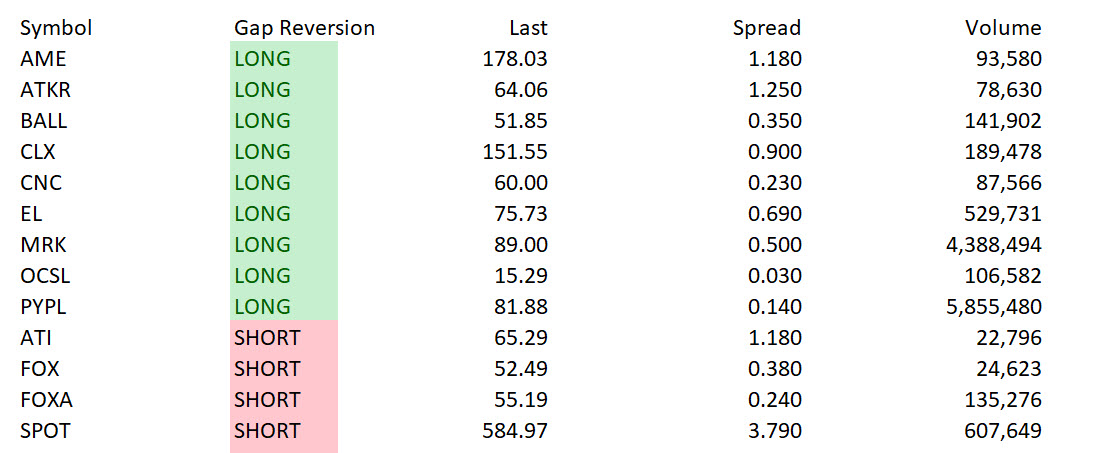The Small Cap Swing Trader Alert Archive
Below you'll find The Small Cap Swing Trader setups stacked up and ordered chronologically.How U.S.-China Tariffs Impact the Stock Market: What Investors Need to Know
How U.S.-China Tariffs Impact the Stock Market: What Investors Need to Know
Understanding the Tariff Battle
The U.S.-China trade war has been a defining feature of global economic relations for years. The latest round of U.S. tariffs on China and China’s retaliatory measures are reigniting concerns about supply chain disruptions, increased production costs, and overall market volatility. Investors are closely monitoring how these policies could impact corporate earnings, economic growth, and sector-specific trends.
Immediate Stock Market Reactions
Historically, when tariffs have been announced or escalated, the stock market has reacted swiftly. The most affected sectors include:
- Technology: Many U.S. tech giants, including Apple and Nvidia, rely on Chinese manufacturing and supply chains. Higher tariffs could increase costs and reduce profit margins.
- Manufacturing and Industrial Stocks: Companies like Boeing and Caterpillar that depend on global trade may face lower demand and supply chain disruptions.
- Consumer Goods: U.S. retailers that import goods from China, such as Walmart and Target, might pass on higher costs to consumers, potentially dampening consumer spending.
Related Reading:
Economic Growth and Inflation Concerns
One of the key concerns is how these tariffs will impact U.S. economic growth and inflation:
- Higher Prices for Consumers: Tariffs act as an indirect tax, increasing costs for businesses and consumers. With inflation already a major concern in 2024, additional tariffs could exacerbate price pressures.
- Supply Chain Disruptions: Many U.S. companies source materials and products from China. Tariffs could force businesses to restructure their supply chains, leading to temporary slowdowns and inefficiencies.
- Federal Reserve Policy Implications: If tariffs contribute to inflation, the Federal Reserve may respond with a tighter monetary policy, affecting stock valuations and interest rates.
Further Insights:
China’s Retaliatory Tariffs and Their Impact on U.S. Companies
China has responded with its own tariffs, primarily targeting:
- Agricultural Exports: Soybeans, corn, and pork are among the hardest-hit U.S. exports, putting pressure on American farmers.
- Automobile Industry: U.S. automakers like Tesla and General Motors face potential sales declines in the Chinese market.
- Luxury and Consumer Goods: American brands with significant Chinese customer bases, such as Nike and Starbucks, may experience reduced demand due to tariffs or consumer boycotts.
What This Means for Investors
Investors should prepare for increased market volatility as trade tensions evolve. Some strategies to consider:
- Diversification: Reducing exposure to sectors most affected by tariffs and focusing on resilient industries.
- Monitoring Economic Data: Watching for key reports on inflation, GDP growth, and corporate earnings to gauge potential market shifts.
- Hedging Strategies: Using options or sector rotation strategies to manage risks associated with trade-related market swings.
Conclusion
The ongoing U.S. tariffs on China and the resulting retaliatory measures are reshaping the stock market landscape. While certain industries face challenges, others may find opportunities in shifting global trade patterns. Investors should stay informed, adapt strategies, and closely watch geopolitical developments for signs of further escalation or resolution.
Further Reading:
February 4, 2025

Trump Tariffs Market Impact: What Traders Need to Know Before Monday’s Open
Trump Tariffs Market Impact: What Traders Should Expect on Monday
President Donald Trump’s recent announcement of significant tariffs on imports from Canada, Mexico, and China is set to create ripple effects across financial markets. The Trump tariffs market impact is already visible in the futures markets, with U.S. stock index futures falling sharply.
The administration has imposed a 25% tariff on imports from Canada and Mexico, along with a 10% tariff on Canadian energy resources and select Chinese goods. These measures are expected to trigger volatility as markets open on Monday. (White House)
Immediate Market Reactions
In response to the tariffs, stock market futures took a hit. Dow futures dropped by 1.5%, with similar declines seen in the S&P 500 and Nasdaq 100. Asian markets, particularly the Nikkei 225, and South Korean equities, also showed sharp downturns. Bitcoin, often considered a hedge against market uncertainty, saw a drop to $93,900. (MarketWatch)
The Trump tariffs market impact is also being felt in currency markets. The U.S. dollar surged over 1%, negatively affecting the Canadian dollar, Mexican peso, and euro. The stronger dollar could put additional pressure on multinational corporations that rely on exports. (Financial Times)
Anticipated Market Impact on Monday
As the markets open, traders should expect heightened volatility and sector-specific consequences from the Trump tariffs market impact:
- Energy Sector: The 10% tariff on Canadian energy resources could increase costs for U.S. refiners, leading to potential price hikes for gasoline and oil products. This will directly impact energy stocks and transportation-related businesses. (MarketWatch)
- Consumer Goods: The tariffs on Mexican and Chinese imports could push up prices for electronics, automobiles, and agricultural products. Companies that rely on these imports may see lower profit margins due to rising costs. (New York Post)
- Inflation Concerns: Economists warn that the Trump tariffs market impact could contribute to higher inflation in the U.S., making borrowing more expensive and putting pressure on the Federal Reserve’s monetary policy. (Financial Times)
Strategic Considerations for Traders
Given the uncertainty surrounding the Trump tariffs market impact, traders should consider the following strategies:
- Monitor Key Economic Indicators: Keep an eye on inflation reports, consumer spending data, and corporate earnings releases to gauge how businesses and consumers are reacting to the tariffs.
- Diversify Portfolios: To mitigate sector-specific risks, traders should look at safe-haven assets such as gold, defensive stocks, or ETFs that are less affected by tariff-related volatility.
- Stay Informed: Markets are highly reactive to policy changes. Traders should follow financial news updates from reputable sources to track ongoing developments regarding the Trump tariffs market impact.
Conclusion
The Trump tariffs market impact is expected to create significant volatility in equities, futures, and currency markets. While some sectors may benefit, others—particularly energy, manufacturing, and consumer goods—are likely to experience disruptions. As traders prepare for Monday’s opening bell, staying strategic, informed, and adaptive will be key to navigating these turbulent conditions.
Good Trading,
Adrian Manz
Links to related articles on TraderInsight.com
Trump Canada-Mexico Tariffs
Trump’s Canada-Mexico Tariffs: What Traders Need to Know
On January 31, 2025, Reuters reported that former President Donald Trump is set to announce new tariffs on imports from Canada and Mexico, effective March 1. These Trump Canada-Mexico tariffs could have significant ramifications across various sectors of the stock market. Here’s what traders should watch for:
Trump Canada-Mexico Tariffs Sector Analysis
Automotive Sector: Facing a Major Hit
The North American auto industry is deeply integrated, with parts and vehicles crossing borders multiple times before final assembly. A 25% tariff on imports from Canada and Mexico could significantly impact automakers such as General Motors (GM), Ford (F), and Tesla (TSLA), as well as parts manufacturers like Magna International (MGA) and BorgWarner (BWA). Higher costs could lead to reduced profit margins, potential price hikes, and lower demand, causing volatility in these stocks. Trump Canada-Mexico tariffs will be a major factor in shaping the automotive sector’s outlook.
Energy Sector: Crude Oil Uncertainty
Canada is the largest supplier of crude oil to the United States. The uncertainty around whether Canadian and Mexican oil will be subject to tariffs could drive volatility in energy stocks, particularly in companies like ExxonMobil (XOM), Chevron (CVX), and Canadian firms such as Suncor Energy (SU). If Trump Canada-Mexico tariffs include crude imports, expect higher gasoline prices and potential profit squeezes for refiners like Valero (VLO) and Marathon Petroleum (MPC).
Agriculture: Higher Food Prices and Retaliatory Risks
The U.S. imports a significant portion of its fruits, vegetables, and other agricultural products from Mexico and Canada. Companies like Fresh Del Monte (FDP) and Bunge (BG) could see cost increases that might be passed on to consumers. Additionally, if Mexico retaliates with tariffs on U.S. farm goods, agricultural giants such as Archer Daniels Midland (ADM) and Deere & Co. (DE) could experience price swings and revenue uncertainty. Trump Canada-Mexico tariffs will be a key concern for traders in this sector.
Retail and Consumer Goods: Rising Costs, Falling Margins
Retailers and consumer goods companies that rely on North American supply chains—such as Walmart (WMT), Target (TGT), and Costco (COST)—may face cost pressures. Higher prices on imported goods like electronics, beer, and clothing from Mexico could lead to lower consumer spending, squeezing margins for companies dependent on price-sensitive shoppers. The Trump Canada-Mexico tariffs could significantly alter pricing strategies and consumer behavior.
Construction and Materials: Tariffs on Lumber and Aluminum
The construction industry relies heavily on Canadian lumber and aluminum. Companies like Weyerhaeuser (WY) and West Fraser Timber (WFG) could see rising costs. Higher aluminum prices would also impact firms like Alcoa (AA) and Century Aluminum (CENX), while homebuilders such as D.R. Horton (DHI) and Lennar (LEN) might struggle with increasing material costs. These Trump Canada-Mexico tariffs could disrupt supply chains and construction pricing models.
Technology: Electronics Supply Chain at Risk
Many electronics manufacturers and suppliers import components from Mexico. Companies such as Apple (AAPL) and Qualcomm (QCOM) could face supply chain disruptions or increased costs. Meanwhile, firms like Foxconn (HNHPF), which has operations in Mexico, may need to rethink logistics to mitigate the impact. The Trump Canada-Mexico tariffs could force tech firms to find alternative sourcing strategies.
Trump Canada-Mexico Tariffs – Broader Markets
Market Reactions and Trading Strategies
The looming tariffs could inject volatility into the markets, creating opportunities for traders who are prepared. Here are a few potential strategies:
- Shorting vulnerable sectors: Auto manufacturers, retailers, and agriculture stocks could see near-term downside pressure.
- Opportunistic long positions: Energy and certain industrial stocks may benefit from supply chain shifts and pricing adjustments.
- Watching retaliatory tariffs: If Canada and Mexico impose countermeasures, specific U.S. industries could experience heightened risks.
- Monitoring exemptions: If exemptions are granted, some stocks may recover quickly, creating reversal trading opportunities.
Final Thoughts
Trump Canada-Mexico tariffs could have sweeping implications for the North American economy. While the final details remain uncertain, traders should prepare for increased volatility and sector-specific impacts. As always, staying ahead of the news and adapting trading strategies accordingly will be crucial in navigating these market changes.
For real-time analysis and trade insights, join us in the War Room as we track how these developments unfold and impact market movements.
Good Trading,
Adrian Manz
For updates see Trump will implement tariffs on Mexico, Canada and China on Saturday | Reuters
Related articles at Traderinsight.com:



